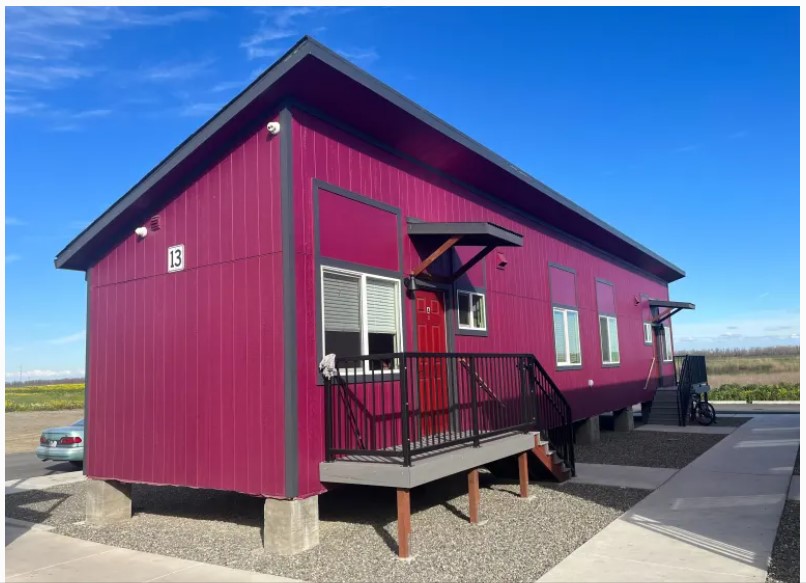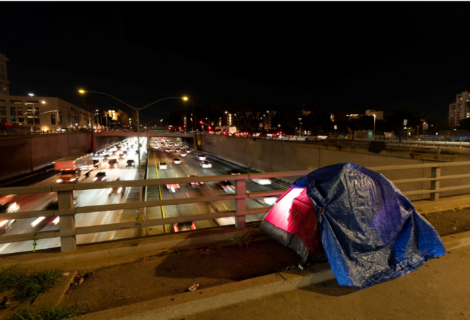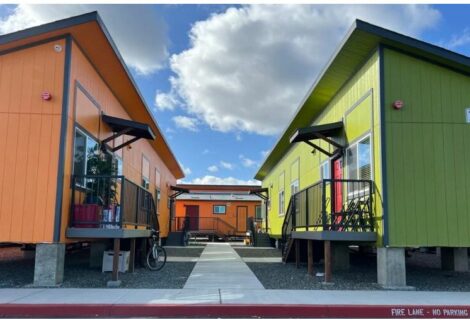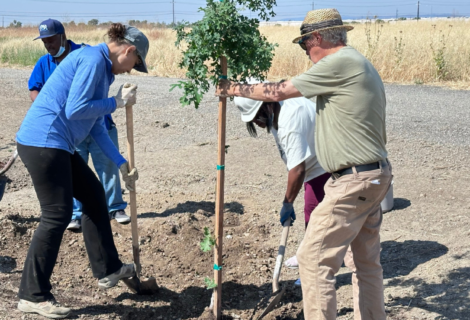PERMANENT SUPPORTIVE HOUSING UNITS FULLY OCCUPIED IN WOODLAND
Roughly a year after beginning work on constructing 61 supportive housing units in Woodland aimed at tackling the city’s homelessness problem, a coalition of organizations and the city announced earlier this week all units are now fully occupied.
The “tiny homes,” located at 1901 E. Beamer St., were fabricated locally by Woodland’s Cutting Edge Modular and opened at the end of 2022. They provide “dignified shelter” while those in need work to improve their circumstances, according to a city press release.
“Living here allows me to love myself more deeply while I apply for employment within the neighborhood,” permanent supportive housing resident Sabrina Truelove stressed.
The units come fully furnished and with support from on-site staff and regular case management from project partners Fourth & Hope, Yolo County and Hope Cooperative.
“Evidence suggests that permanent supportive housing is one of the most effective interventions to reduce homelessness,” the release stated. “A recent randomized trial from the University of California, San Francisco…demonstrated that permanent supportive housing helps chronically unhoused individuals get housed and stay housed much more effectively than comparable interventions.”
City officials and local stakeholders were invited and shown example supportive housing units last year. The units had a bedroom, bathroom, a washer and dryer, a small kitchenette with several cabinets, a double bowl sink and space for an electric stove that would eventually be added.
Woodland Mayor Victoria Fernandez said she was proud of the collaboration between the city, county, state and nonprofit organizations that made this project a reality.
She emphasized the importance of investing in the East Beamer Neighborhood Campus — an adult-only emergency shelter that will provide housing and residential mental health and substance use assistance — because she believes “in the opportunity it will provide those in need.”
“We are indebted to those who dedicated countless hours to help this vision become a reality for our community of unhoused residents,” she added. “I hope that we are ‘the light in all the darkness’ for those struggling with life’s challenges and that we are providing a safe and healthy place for them to call home.”
Point-in-time count
Yolo County’s 2022 point-in-time count identified 746 people experiencing homelessness, with 22% of individuals surveyed saying they’ve lived in the county their entire lives and nearly 50% saying they came to the county because they grew up here or have friends and family here.
According to the report, Woodland had 267 homeless people in last year’s count, which amounts to 44.4 individuals experiencing homelessness per 10,000 residents. This is up from the previous count that showed 39.4 homeless residents for every 10,000 in Woodland and is the second-highest rate of homelessness in the county behind West Sacramento, which had 53.8 homeless residents per 10,000.
The East Beamer Campus project is one of the city and county’s efforts to achieve “functional zero” homelessness — measured by the number of permanent housing minus the number of people experiencing homelessness.
California Homekey funding
The city was awarded $15.8 million in California Homekey funding last year to support the completion of the campus’ phase two projects, which includes the construction of the permanent supportive housing units and community center.
The Woodland City Council approved a resolution Tuesday executing a 55-year regulatory agreement with Friends of the Mission for the project — a requirement of the state’s Homekey grant program.
“In addition, all use restrictions shall require integration of the ‘target population’ within all areas and buildings that comprise the project and all use restrictions shall include occupancy and rent restrictions that maintain the project’s accessibility to the ‘target population,’” the city staff report stated.
The target populations are individuals and families who are homeless or at risk of homelessness, the report added.
“Per grant guidelines, the rental costs of the units shall be set at a rate that is considered affordable to extremely low-income households (30% of area median income for Yolo County) as determined by the California Department of Housing Community Development on an annual basis,” the report added. “The project also complies with regulations that govern the project-based voucher program through Yolo County Housing.”
Walter’s House
The campus is owned by Friends of the Mission and operated by Fourth & Hope. Its 61 permanent housing units, emergency shelter and substance abuse center aim to provide what Doug Zeck calls a “hub of hope.”
Zeck is the executive director of Fourth & Hope — a faith-based nonprofit organization with the mission of providing food, clothing and shelter for those in need. He reminisced on a time when he stood in an empty 8-acre field where the emergency shelter and housing units now stand, envisioning his nonprofit’s future.
“I thought if we could bring homeless services together in one place, we could change many lives,” Zeck emphasized. “Three years later, I stand in the same field surrounded by our 100-bed emergency shelter and a permanent supportive housing community home to 75 individuals.”
Beyond that, Zeck sees the groundbreaking site for Walter’s House, which will be a residential substance abuse and rehabilitation services center built at the East Beamer Way Campus sight alongside the units and shelter.
Walter’s House will be the third and final building phase and is anticipated to be fully operational by summer 2023.
Last year’s count found that at least 13% of homeless people surveyed said they suffered from a substance use disorder.
“This hub of hope is built by the collaboration and support of this community and agency partners,” he highlighted. “It has changed the trajectory of our neighbors experiencing homelessness while providing a model for a homeless service campus.”
Gena Bravo, president and CEO of Woodland Memorial Hospital, said that her hospital’s Homeless Health Initiative is “grateful to have contributed funding to the development of” the campus.
“We have a long-standing commitment to collaboration and serving our community members who are experiencing homelessness,” Bravo remarked. “It’s amazing to see what a group of mission-oriented organizations and people can achieve together. I know that this program will have a lasting impact on the health and vibrancy of those served and our community.”










Recent Comments